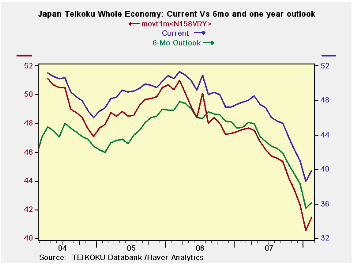 Global| Mar 06 2008
Global| Mar 06 2008Japan Economy Shows Weakening Sectors and a Weakening Outlook
Summary
The Teikoku indices show a weakening Japan economy. Just today Japan policymakers, commenting on the state of the economy, were saying that it is weak and did not know if the word ‘recession’ should be used in connection with it. The [...]

The Teikoku indices show a weakening Japan economy. Just today Japan policymakers, commenting on the state of the economy, were saying that it is weak and did not know if the word ‘recession’ should be used in connection with it. The Teikoku index hit a five year low in January and has recovered slightly in February. The NTC MFG index is also weak but not quite as weak as the Teikoku MFG reading; it is not in the bottom 5 percent of its range but in the bottom 30% of it.
The Teikoku outlook indices show that progressively greater weakness is expected looking ahead. While each of these indexes, the current, the 6-mo ahead and 12-mo ahead index, has fallen, each has also made a small rebound in February. Up until now, Japan has taken a mostly upbeat view of the economy. It took Japanese officials a long time to downgrade the economy and its prospects. But the slide in the economy is now undeniable. Still, like the US, we do not yet know how far the economy will skid.
| Key Japanese Surveys | |||||||
|---|---|---|---|---|---|---|---|
| Raw readings of each survey | Percent of 5Yr range* | ||||||
| Feb-08 | Jan-08 | Dec-07 | Nov-07 | Feb-08 | Jan-08 | Dec-07 | |
| NTC MFG | 50.8 | 52.4 | 52.3 | 50.8 | 30.5% | 47.4% | 47.3% |
| Econ Trends (Teikoku'/50 neutral/weighted diffusion) | |||||||
| MFG | 38.5 | 37.9 | 40.8 | 41.7 | 4.4% | 0.0% | 0.0% |
| Retail | 32.6 | 31.3 | 34.2 | 34.4 | 9.4% | 0.0% | 0.0% |
| Wholesale | 35.3 | 34.5 | 37.0 | 38.3 | 6.3% | 0.0% | 0.0% |
| Services | 41.0 | 40.4 | 43.5 | 45.0 | 5.4% | 0.0% | 20.1% |
| Construction | 29.7 | 28.9 | 32.0 | 32.6 | 7.5% | 0.0% | 16.4% |
Robert Brusca
AuthorMore in Author Profile »Robert A. Brusca is Chief Economist of Fact and Opinion Economics, a consulting firm he founded in Manhattan. He has been an economist on Wall Street for over 25 years. He has visited central banking and large institutional clients in over 30 countries in his career as an economist. Mr. Brusca was a Divisional Research Chief at the Federal Reserve Bank of NY (Chief of the International Financial markets Division), a Fed Watcher at Irving Trust and Chief Economist at Nikko Securities International. He is widely quoted and appears in various media. Mr. Brusca holds an MA and Ph.D. in economics from Michigan State University and a BA in Economics from the University of Michigan. His research pursues his strong interests in non aligned policy economics as well as international economics. FAO Economics’ research targets investors to assist them in making better investment decisions in stocks, bonds and in a variety of international assets. The company does not manage money and has no conflicts in giving economic advice.






